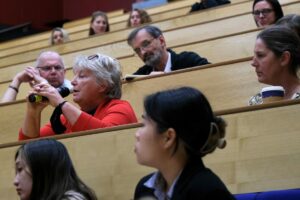‘To see that the choices facing us are simple and stark: reduce car use!’
What is the most striking thing you have seen, heard, or experienced today? (Anonymous)
Last week, students from many different modules gathered to share their work with each other and with the public as part of the Pint of Science Festival. With each module exploring how their subject can benefit the discussion around air pollution at the junction, the festival was packed full of variety and distinct insights. From analysing the physical space to becoming passionate activists, students challenged how the public perceive the junction and explored ways pollution can be tackled.
‘If you can smell it, if you can taste it, then trust me the air pollution is there’
The event commenced with the incredible Keynote speaker, Rosamund Kissi-Debrah. Kissi-Debrah delved into clean air advocacy after her daughter, Ella, died due to an asthmatic reaction to high levels of air pollution in 2013. Her work has strived to ensure healthier living conditions for young people, and to make the government view bad air quality as a public health crisis that needs addressing. She states, ‘you’re basically asking people to believe that this thing that they can’t see with the naked eye, is actually causing worldwide premature [deaths]. 7 million people die prematurely from air pollution.’ But, as she explained, there scientific links to heart disease and other illnesses, and more will be discovered. Better understanding of the health impacts can really help push activism forward, as Biomedical student, Olivia, explains— ‘through research, I now have a wider scientific understanding [and] can engage in conversations with friends/family’
‘Don’t Pollute Your Commute’
At the research stalls, students from Biomedical Sciences, Drama, Geography, Graphic Design and Linguistics shared what they had learnt through exciting and engaging methods. From zines and displays, to badges, stickers, and podcasts, the student work was abundant in creativity and passion for change. These stalls also included the Estates Team who explored how the university can support student proposals, and the City of York Council who showed current and future plans within the city.


Graphic Design students displaying their work.
Powerful Performances
At the event there were several impressive performances from Music and Drama students. Music students were challenged to compose more experimental and potentially non-traditional pieces in response to data and experiences. The results at the festival were captivating pieces which embodied experiences of the junction. Following this, members from the two modules collaborated to perform the song ‘Dear Child’.

Drama and Music students performing together.

One of the Drama students, Adina, performed a spoken word piece:
‘I truly would not know what to say to you about this. Its not my fault but it still feels like I’m failing. How could I do it to her? To the mother? How could I hurt and corrupt something so pure… for my own personal benefit. How could I stand by and do nothing while she withered? I have a lot of feelings about our planet. Mostly regret. At how I know her time is near and so is mine.
I think of all the things I dreamed I would do in the many years to come. Can I go on living when she’s gone? Is it possible? Is there life after death?
When the mighty tree’s roots fail to keep the earth from falling… When they collapse and take my oxygen away. Will a breathing mask keep me sustained? Will that be enough?
Will I see my son run barefoot on the grass, in a valley where birds sing and I dance? Will I see my daughter’s clear reflection in the river? Will she know the taste of strawberries and the smell of flowers? Will she know the feeling of rain softly falling down her skin?
I wonder. I wonder what I can do to make sure that happens.’
Councillor D’Agorne, who has been working alongside the Living Lab in transport policy making, remarked: “it was wonderful to see the creative subject-based approaches students took in looking at the issue of local air pollution. The research shared sparked many fruitful and engaging dialogues with the public- something which I hope will continue into future projects. I look forward to continuing to work with York St John University and its Living Lab to solve issues collaboratively, and to work together towards a greener York.”
‘Where do we go in the future?’
The event was closed by the final Keynote speaker, Professor Alastair Lewis, an atmospheric chemist from the University of York. In his hard-hitting presentation, ‘Past, Present, and Future for Air Quality in the UK’, Prof. Lewis explained the significance of good air quality, and how pollutants cause ill health throughout the UK and the world. He argued that we must push for decisive policy making to tackle this issue.

